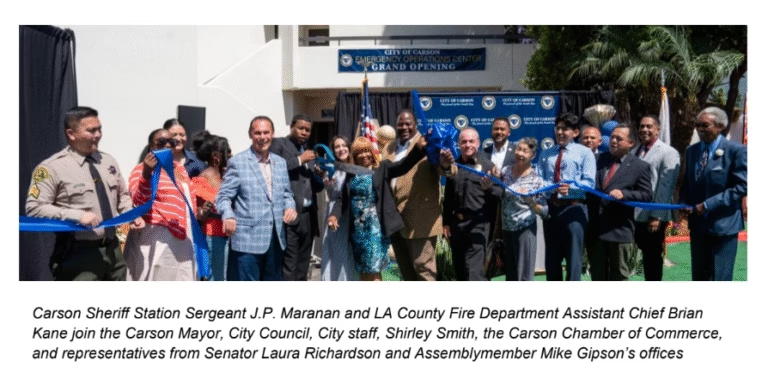CARSON — The City of Carson June 18 announced the grand opening of its newly upgraded Emergency Operations Center or EOC — a milestone in enhancing the city’s public safety infrastructure and emergency preparedness capabilities.
This advanced facility represents an investment in protecting Carson’s residents and ensuring rapid, coordinated responses to emergencies, natural disasters, and major events, including the highly anticipated 2028 Olympic Games.
EOC Highlights:
Cutting-Edge Technology: The EOC features a five-screen video wall powered by synchronized iPad control systems for each screen section, enabling real-time switching between sources and departments. Integrated surveillance and live news monitoring provide vital situational awareness.
Upgraded AV & Communications Systems: The new facility includes advanced audiovisual tools, operator workstations, and emergency communication systems designed to streamline multi-agency coordination during crises.
Modernized, Resilient Infrastructure: Built with secure networks, backup power systems, and rapid-response layout designs, the EOC ensures operational continuity under the most demanding conditions.
Interagency Collaboration Ready: The facility is purpose-built to accommodate joint responses from law enforcement, emergency services, and regional partners, positioning Carson as a leader in coordinated disaster response.
“This new Emergency Operations Center reflects Carson’s commitment to protecting our residents and preparing for tomorrow’s emergencies today,” said Mayor Lula Davis-Holmes. “As we look ahead to major global events like the 2028 Olympics, this facility gives us the tools to respond effectively, collaboratively, and resiliently.”
In addition, the city has also completed renovations to its public safety, information technology and security departments, aligning all critical emergency systems under a modernized and sustainable infrastructure strategy.
The newly constructed facility also features modular DIRTT walls or Doing It Right This Time, offering space flexibility and eco-conscious design. These walls use high percentages of post-consumer recycled cotton denim insulation, providing excellent sound absorption, thermal performance and environmental sustainability.


















